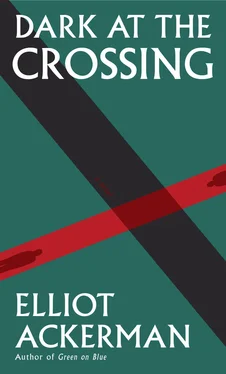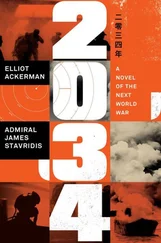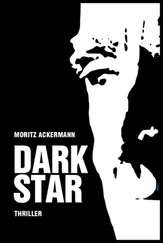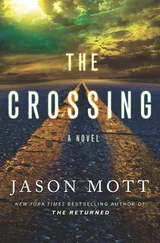“Climb in,” said Athid.
Before Haris could pick up his bag, Jamil vaulted onto the tailgate.
Athid grabbed him by the shoulder. “You’ll sit up front with me.”
The driver pointed to Jamil’s satchel and Bashar. “Not with that dog.”
“It’s all right,” Jamil said. “I can go in back.”
“No, it’s better if you ride in the cab. We’ve much to discuss, and you should see the places where you’ll be fighting. Let Daphne look after Bashar.” Athid’s voice was warm, fatherly. Jamil handed over the satchel. Then Athid turned toward the driver, fixing him in an insistent stare. The driver said nothing more, and walked briskly up to the truck’s cab.
Standing among Haris and the others, Athid dispensed some final instructions. He explained that they’d pass through the border crossing just outside Kilis, that under no circumstances were they to open the tarpaulin. Once across, they’d take Route 214 into Azaz, but south of Azaz, past the last of the Daesh checkpoints, the regime actively patrolled the road. “So stay under the tarpaulin,” he said. Haris and Daphne nodded. Athid gave them a last, appraising look. “Okay,” he answered. Then, with that matter settled, he looped his arm around Jamil’s neck, playfully leading him up to the front of the truck.
Daphne hoisted herself into the bed. Haris followed, and as he stepped onto the rear tire, climbing into the back, Jamil stood on the cab’s running board, glancing at him from over his shoulder. Their eyes met. The truck lurched into first gear. Jamil lost his balance for a moment, as if he might stumble onto the road. Then Athid reached out and pulled him inside.
—
Beneath the covered flat bed,the air was thick with breath. Haris and Daphne faced each other, perched on the benches nearest the tailgate. As they drove through Kilis, Haris craned his neck toward a seam in the tarpaulin, stealing glances of the neon shopfronts and lamplit homes. Everything blended into a kaleidoscopic night scene. Watching the street slip toward the border, Haris would’ve traded places with any of the lumbering passersby.
Outside of Kilis, the road ran straight and even toward the border. The glowing cityscape dissolved. The darkness in the fields matched the darkness in the truck bed, and the seam Haris glanced through became an indistinguishable aperture, black as everything else.
He leaned back on the bench, brushing shoulders with the man next to him.
“Lost interest?”
Haris turned toward the voice, his eyes meeting an impenetrable night. “Not much to look at,” he answered.
“You are from Aleppo?”
“No,” said Haris, not wanting to offer anything more about his business.
He could feel the man nod through their touching shoulders. From deeper in the truck a baby, or maybe several, began to cry. Someone coughed violently. For the first time, Haris noticed the ascending din of so much proximate humanity — breathing, hacking, crying. This racket became louder and louder. Or, as Haris realized, it didn’t become louder, he only became more aware of it.
“That’s good.” The voice rose above the other noises, cutting them down to a relative whisper.
“What’s good?” asked Haris.
“That you’re not from Aleppo, such a troubled place.” The man shifted in his seat. “Neither am I,” he said. His warm breath, thick and musty as broken earth, fell into Haris’s face. “I live a ways outside the city.”
“What do you do there?”
“I raise crops.” The farmer reached into the pocket of his tattered suit jacket and pulled out a small envelope. He pressed it into Haris’s hands so he could feel its modest size. “Last year was cotton,” he said. “It’s tough on the soil. In this packet is barley seed, next season’s planting.”
“Your whole crop is in that one envelope?”
“Everything I’ll need for the year.”
Haris felt anxious for the farmer, holding so much in so small a place. “The war must be hard on you.”
The farmer said nothing. The sound of the others inside the truck became louder in the silence. Then, speaking as if he tried to draw an ugly truth back into himself, the farmer answered: “My crop grew before the war. With the war, it grows the same.”
“But your family?” asked Haris.
“It’s only my wife and daughter. They are safe. I’m able to provide for them.”
“But to see this in your country—”
Haris and the farmer knocked against each other as the truck downshifted, rattling into a lower gear. The darkness outside slowly yielded to an orange, sulfuric light. Haris leaned forward, gazing through the tarpaulin’s seam. Beneath the floodlit border crossing, he could see the café where he’d sat the week before with Saied and Athid. In the distance, past the café, was the large tent which served as a mosque. A stream of refugees came and went from it in the night. Haris strained to recognize a familiar face. At first he couldn’t find one, but then, as he looked, he felt he recognized them all — eyes cast to the ground as they walked, shoulders stooped against the wind. What he recognized wasn’t a single person but a single form of suffering, one he knew in himself: a home and a life taken away. Purposelessness.
“I’m supposed to care for my family,” said the farmer, “not run off and fight.”
“I came to fight,” said Haris. The words wandered out of his mouth. He didn’t know he’d spoken them until he heard what he’d said.
The farmer no longer paid attention to Haris. His focus had shifted to the woman next to him, and the little girl in her lap, sleeping against her chest. Any temptation within Haris to dismiss the farmer as a coward or shirker for not fighting dissolved at seeing how he watched over his family. He refused to fight not because he didn’t believe, but because he did, in them. As he was thinking this, Haris’s stare found Daphne across the truck’s bed. He wondered how he looked at her, if somewhere in his eyes was the look that had passed between the farmer and his family.
The truck jerked to a stop. It idled at the shut steel gate of the border crossing. Haris peeked out at the Plexiglas booth where the gendarmes stood their post. He saw the familiar silhouette of the tall, slim gendarme from before and his short, thick colleague. The booth’s door swung open, spilling its light onto the road. From a television inside, the maniacal loop of a laugh track pierced the night’s silence. The short gendarme shuffled toward the truck, his unbuttoned blue tunic sustained behind him in a current of breeze. He came around to the passenger side of the cab, climbing up the running board. Athid’s arm extended from the window, a thick white envelope in his hand. He passed it to the gendarme, who glanced at its contents, a wide smile loosening all the way to the bristled corners of his face. A few unintelligible words passed between him and Athid. Then the gendarme began to laugh, his voice blending with the television inside the booth. He jumped down from the running board. As he walked around the back of the truck, Haris wondered if he’d look in the bed and, if he did, what the gendarme would say, or not say, upon seeing him again.
Instead, the gendarme passed by, uninterested in whatever traveled beyond his small checkpoint. The door to the guard booth shut. The gate opened. The recorded sound of laughter receded to silence as darkness returned to the road.
—
The truck accelerateddown Route 214, a single corridor running through the outskirts of Azaz. Rimming the city, fires burned from a recent round of shelling. Scarves of mist slipped between buildings, and everywhere else night lay thick in the streets. Then the light came up gradually, like the end of a show, and Haris squinted into the flames, finding the skyline. It was picketed with upended telephone poles tossed onto rooftops, their dark wires draping softly down the pockmarked façades, cascading to the curbsides. Over the years of fighting, the houses next to the road had been pounded to mosaic by explosives as varied as the bits of wood, cement, and glass they left behind. The houses in the heart of the city had fared no better, with entire walls lopped off clean, like shoe box dioramas. The truck slowed, a splash of water running over the hood. Up the street a burst main threatened to drown Azaz before it could burn entirely.
Читать дальше












